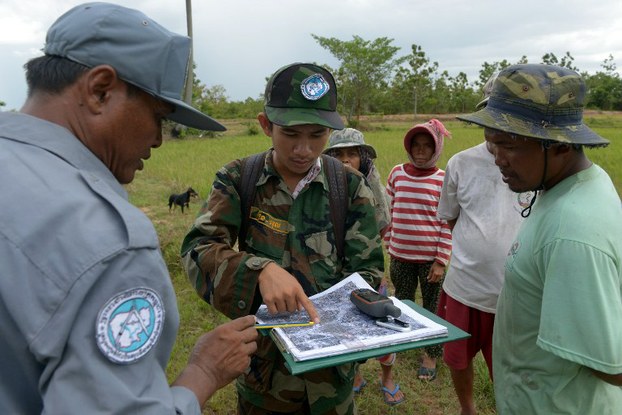




More than half a million Cambodians have been affected by land conflicts involving the government since 2000, with more than 2,000 families across the country subjected to largely violent land grabs during the first few months of this year, local rights group Licadho said Tuesday.
The number of people involved in state-related land conflicts in the past 13 years surpassed the 500,000 mark last month, Licadho said in a statement, calling on the government to end land grabs.
Some 2,246 families had been affected by “a renewed wave of violent land grabbing” since the beginning of 2014 in provinces the group monitors, it said.
The group also slammed a May 2012 directive by Prime Minister Hun Sen to suspend all new land concessions and review existing concessions, saying the move has done little to prevent disputes in the last two years.
Licadho director Naly Pilorge called the latest figures “shocking,” adding that many of those affected by the conflicts are facing “severe and long-term hardship.”
“Without land, they no longer have the means to provide themselves with the basic requirements for a decent life,” she said.
“The government must act now to end this epidemic of land-grabbing.”
Senior Licadho official Am Sam Ath told RFA’s Khmer Service that the government has been ineffective in combating the problem of land disputes.
“The government has failed to examine whether those companies [which have received land concessions] are respecting the terms of their contracts to implement the concessions,” he said.
He also questioned the enforcement of the temporary ban on land concessions, saying that the government has been “secretive” about it.
Am Sam Ath criticized Hun Sen’s administration for refusing to acknowledge reports by nongovernmental organizations seeking to provide solutions to what Licadho termed the country’s “ongoing land crisis.”
Chheang Vun, a senior official of Hun Sen's ruling Cambodian People’s Party (CPP) and spokesman for the National Assembly, the country's parliament, said he has no interest in NGO reports on land issues, calling them “biased” and saying they “serve donor country’s agendas against the government.”
The World Bank halted funding to Cambodia in 2011 after state security forces helped to violently evict thousands of families from the Boeung Kak lake community in Phnom Penh to make way for a real estate project in one of the country’s most-high profile cases.
“We are not interested in Licadho’s report—we know their agenda,” Chheang Vun said, without elaborating.
Deutsche Presse-Agentur quoted government spokesman Phay Siphan as saying that the country’s leadership "try to do their best" in curbing land disputes.
"I understand there are still a number of cases that are so complicated that they have to go to the courts," he said.
Recent disputes
In its statement, Licadho detailed a number of disputes it had monitored since the beginning of 2014, including a campaign by hundreds of indigenous villagers in Preah Vihear province to prevent a Chinese enterprise from clearing communal forests and scores of families seeking compensation after their homes were demolished by a developer in Koh Kong province.
In March alone, the group said, unknown assailants attacked a campaigner involved in a longstanding land dispute in Phnom Penh’s Toul Kork district, a government official fired live ammunition into the air to intimidate villagers protesting a land grab in Pursat province, and 600 families in Svay Rieng province attempted to prevent the clearing of disputed land by heavy machinery and security forces.
“It is clear that the government’s directive has not fully taken effect, as there is no evidence that any effective review of existing land concessions has taken place,” despite a recent announcement that previously granted concessions left unused will be resold, Licadho said.
“It is also apparent that the land titling program has failed to put an end to disputes.”
In addition to the suspension and review of land concessions, Prime Minister Hun Sen established a land titling program in late 2012 relying on more than 2,000 student volunteers to measure plots and distribute documentation, but critics have said the campaign lacks transparency and independent monitoring.
Recommendations
Licadho called on the government to “put a genuine end” to forced evictions and provide “fair and adequate” compensation to those who have been forcibly displaced or had their land unlawfully confiscated.
It said the government must carry out its promised review of economic and other land concessions and take no further steps to resell old land concessions until the review has taken place.
The land demarcation and classification process should be carried out transparently and in a timely manner, while any future land titling program must operate under the authority of a relevant state institution, Licadho said.
Land disputes are a bitter problem for Cambodia, where rural villagers and urban dwellers alike have been mired in conflicts that the U.N.’s special rapporteur for human rights to Cambodia has warned could threaten the country’s stability.
The country’s land issues date from the 1975-79 Khmer Rouge regime, which forced large-scale evacuations and relocations, followed by a period of mass confusion over land rights and the formation of squatter communities when the refugees returned in the 1990s after a decade of civil war.
Reported by RFA’s Khmer Service. Translated by Samean Yun. Written in English by Joshua Lipes.